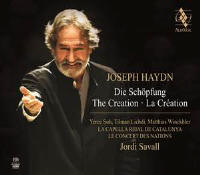Texte paru dans: / Appeared in: |
|
|
Outil de traduction ~ (Très approximatif) |
|
|
Reviewer: Huntley
Dent In Haydn, as in Beethoven, I expected Jordi Savall to tend toward the slam-and-bang school of HIP style, along with truncated note endings to keep the pacing brisk. Matters didn’t eventuate that way—often the opposite. There is no doubt about Savall’s musicality and his long renown as a period specialist. Moreover, no one who isn’t prepared for an absence of string vibrato is likely to be considering this new Creation. I will discreetly pass over the incongruity that Savall’s vocal soloists exhibit a healthy dose of vibrato, which for me is a blessing; I am allergic to the “white” sound of Baroque singing in period style. But even as someone who nominated Herbert von Karajan’s live 1965 DG recording for the Hall of Fame, I hope I am flexible enough to appreciate what Savall and his forces have to say.
Anyone anticipating either a triumph or a failure from this performance will have to settle for the more ambiguous outcome of good mixed with no so good. The recorded sound is clear and reflects the warm, generous acoustic of the venue, a Romanesque church in Cardona, Catalonia (the physical product is two SACDs). Savall’s orchestral ensemble, Le Concert de Nations, is sizable and plays with real excellence on historical instruments. His chorus, La Capella Reial de Catalunya, is just as expert and thanks to its reduced size is able to enunciate the text very clearly.
In general contour Savall’s conducting is buoyant and springy but not to excess, and while he falls into the HIP habit of speeding up exciting passages like the description of the weather and the creatures that emerge at the Creation, there are some slow tempos as well, particularly in Part 3. Aside from the refreshing sonority of historical instruments, this is a surprisingly conventional reading. A fortepiano is used for the continuo accompaniment in the recitatives.
Where problems arise, for me at least, is with the vocal soloists. Some recordings use a different singer for the three angels and Adam and Eve, but Savall follows the usual, more economical practice of having three singers cover all the characters. Perhaps restraint is considered desirable in HIP performances, but I found the soloists here too mild-mannered. They seem to have been chosen expressly to sound pleasingly anodyne. Is star quality a no-no when we’re being authentic? Soprano Yeree Suh has an excellent technique for Haydn’s fioritura passages, and her timbre is sweetly appealing. But her approach is cautious to the point of politeness, and she lends absolutely zero personality to either Gabriel or Eve.
This absence of joy makes an odd contrast with the chorus, which sings with genuine enthusiasm. The choral numbers without soloist are the highlights of Savall’s account, and one could make an outstanding excerpts disc out of them. Tenor Tilman Lichdi has a pleasing lyric tone and good technique, but he makes no dramatic impression whatever. Better is baritone Matthias Winckhler, who besides his native German has a warm, inviting tone that is pleasingly rounded. He’s musical too, and since his angel, Raphael, carries the bulk of the narrative in Parts 1 and 2, Winckhler is certainly the outstanding soloist. Just don’t expect star quality or drama in his singing beyond a certain gentlemanly decorum.
The issue isn’t that anything remotely goes amiss in this performance, but that such a courteous reading sells Haydn’s masterpiece short. There is absolutely no argument for believing that music-making had to be less exciting in Vienna in 1799, the year The Creation premiered and became an instant sensation, than what we expect today. For anyone who disagrees, Savall’s account might sound aristocratic. But somebody should have removed the doilies and tea cozies. This music contains thrills and ecstasies only suggested here.
| |
|
|
|
|
Cliquez l'un ou l'autre
bouton pour découvrir bien d'autres critiques de CD |
|




